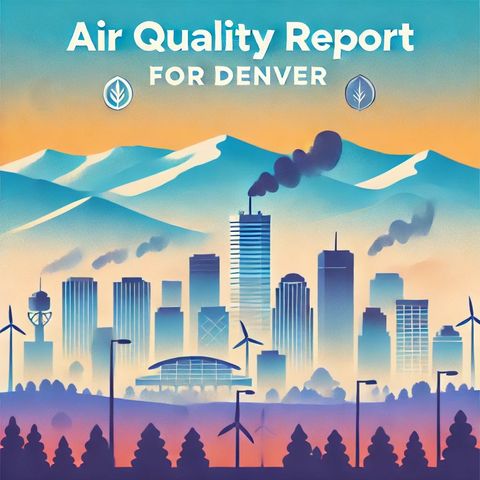Denver's Air Quality Moderately Acceptable, Occasional Concerns for Sensitive Residents

Download and listen anywhere
Download your favorite episodes and enjoy them, wherever you are! Sign up or log in now to access offline listening.
Description
As of today, Denver is experiencing moderate air quality levels, which are typical for this time of year when the weather transitions from summer to fall. The city's air quality...
show moreSeveral factors contribute to the current air quality in Denver. Seasonal temperature fluctuations play a significant role, as temperature inversions can trap pollutants close to the surface, leading to poorer air conditions. An inversion occurs when a layer of warm air traps the cooler air beneath it, preventing pollutants like vehicle emissions, industrial outputs, and wildfire smoke from dispersing. This is particularly prevalent during the cooler months and early mornings.
Denver's proximity to the Rocky Mountains also influences its air quality. The geographical layout can lead to a phenomenon known as the "brown cloud," where visibility is reduced due to a mix of particulates and pollutants. While efforts have been made over the years to improve this, it still occasionally affects the air quality in the metropolitan area.
In addition to inversions and geographical factors, wildfire smoke from nearby regions can significantly impact Denver's air quality. As wildfires have become more frequent in the Western United States, the smoke often travels and contributes to Denver's pollution levels, sometimes pushing the AQI into unhealthy ranges.
To address these air quality challenges, Denver has implemented measures aimed at reducing emissions. The city has been actively promoting the use of public transportation, the adoption of electric vehicles, and enhancing biking infrastructure. Furthermore, Denver has taken strides to improve energy efficiency and reduce its carbon footprint through various sustainability initiatives.
Residents, especially those with respiratory conditions, are advised to stay informed about daily air quality updates. Engaging in outdoor activities when the air quality is better, typically in the afternoon when inversions have lifted, can help minimize exposure to pollutants. Using air purifiers indoors and keeping windows closed during periods of poor air quality can also contribute to healthier living conditions.
As the city continues to grow, monitoring and improving air quality remains a priority for both officials and the community. With ongoing efforts and public awareness, Denver aims to ensure healthier air for its residents while maintaining progress toward sustainability goals.
Information
| Author | QP-5 |
| Organization | William Corbin |
| Website | - |
| Tags |
Copyright 2024 - Spreaker Inc. an iHeartMedia Company
